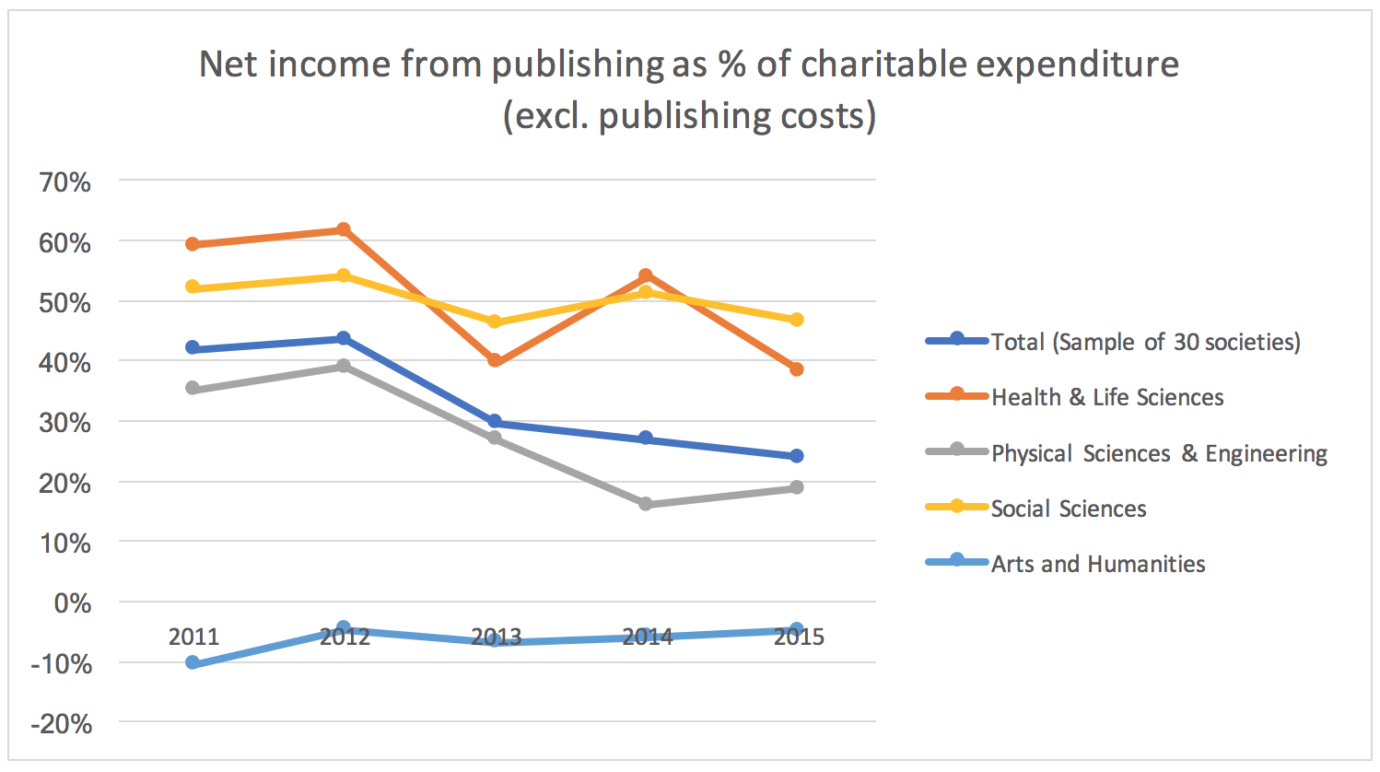Universities UK’s Monitoring the Transition to Open Access 2015 report and its recent 2017 update provide an interesting source of information about the effects of open access on a sample of UK societies. But how well does the data project onto the wider global picture?
In combination with Delta Think’s extensive experience working with more than 70 societies in North America and the UK over the last decade, we can overlay insights we have gathered to put together an understanding of how a shift towards open access publishing might impact learned societies in the mid to long term.
Background
Many learned societies rely heavily on income from publishing peer reviewed journals to fund their wider mission-driven programs and activities. In many cases the majority of publishing income is from institutional subscriptions. When considering the impact of OA from a financial perspective, their primary concern is how APC revenue might replace potential declines in subscription income (and related income including rights, reprints, etc.).
The 2015 study did not find any overall impact of open access on societies, because the UK mandates on open access had yet to come into effect. Its analysis of the published accounts of a sample of 30 UK societies found them to generally be in good financial health, although it did find evidence of declining publishing surpluses. These two trends continued into the study’s 2017 update, which found that:
- Publishing revenues have risen steadily between 2011 and 2015: 18% in total, or a CAGR of just under 1.8%. (This is around half the industry average.)
- Costs rose by 27% over the same period.
- Margins (surpluses) in total fell from 16% in 2011 to 9% in 2015. (Large commercial publishers would expect to see 3-4 x these figures.)
- The average margin fell from 21% to 18% in the same period, suggesting that performance varies hugely between societies, regardless of size.
In the study, publishing surpluses form a high proportion of societies’ expenditure on their other charitable activities, but the proportions are falling. The arts and humanities are the exception where the society often subsidised its publishing program.

Source: Delta Think Inc. analysis and summary of FigShare Data from 22-Feb-18 shared under CC BY 4.0 arising from Universities UK, Monitoring the Transition to Open Access. Chart image shared under CC BY NC.
The study added that “…many societies generate a high proportion of their revenues overseas, and have long-term agreements with commercial publishers. Hence the impact of the transition to OA may not be evident in societies’ finances for a number of years.”
There was a sharp rise in the number of societies reporting a loss on their operating activities. Some of these were one-off activities around restructuring or redistribution, but “many are facing growing inflationary pressures, but see only limited scope to raise revenues from memberships or other sources. To date, most societies have chosen to absorb cost increases rather than reduce the scope of their activities, which largely accounts for the rise in reported losses.”
Analysis
The study “identified no evidence of systemic risk to UK learned societies or their broader financial sustainability, whether from OA or other factors.” However, our experience suggests that this may not be the case globally, and it may mask disruption yet to come.
Many societies are feeling the pressure to move to OA. The very fact that over 70% of journals have a hybrid option demonstrates that societies have seen the need to experiment with OA and offer the choices necessary to accommodate authors and funders. Although many are experimenting with OA, few have fully adapted to it.
When a society adds a hybrid option to their subscription journals, they tend to follow the same editorial and production processes for the OA content within the journal as they do for the subscription content, with relatively minor adjustments to accommodate the APC model. This is particularly true for smaller societies who simply do not have budgets to consider re-architecting or streamlining of workflow and systems. While uptake on the OA option remains low, this is not a problem for them. In fact, it represents a modest revenue increase, as the journal is not yet accepting enough OA content to negatively impact their institutional subscriptions.
If OA uptake increases, this leaves societies vulnerable. Their processes, having been designed to support a subscription “curation” model and its outputs, are not optimized for an author-centric model. Additionally, subscription revenue may be jeopardized. In cases where uptake is very significant, this may force the journal to consider flipping to fully OA. Librarians will be less inclined to renew subscriptions that have a high percentage of OA content. Since hybrid APC’s are, on average, higher than the APC’s commanded by fully OA journals, this may present another financial obstacle for the society.
Finally, OA represents a fundamental shift to an author-centric model and requires developing additional/different competencies and investing more in outreach and marketing. Smaller societies especially will find it hard to find the budgets necessary to adapt and adopt new skills.
Conclusion
At a time when funders are re-examining their OA policies, OA articles in hybrid journals are growing at a faster rate than OA articles in fully OA journals, and it is clear that OA dollars do not replace subscription dollars at the same level, it makes sense for a society to reconsider their position, and many have.
Recognizing that their historical reliance on publishing revenue is a potential threat, many organizations have taken steps to diversify their revenue sources to secure their ability to fulfill their mission. Societies with fewer resources have considered lower cost technology options and other potential alliances to support key functions.
Additionally, OA is not the only pressure impacting societies. There are uncertain global markets, higher user expectations, more pressures to innovate, market consolidations, flat or declining membership rosters, and many other elements societies are navigating.
All of these factors make it an ideal time for societies to examine their mission and the mechanisms they use to fulfill it. What role do peer reviewed publications have in that mission? How can they ensure that their publications will continue to thrive? After clearly defining their value-add and measure of quality, societies may find that it is time to re-evaluate their processes and adapt to the changing market.
![]()
TOP HEADLINES
EOSC-hub and OpenAIRE-Advance get together to support Open Science and the European Open Science Cloud initiative – May 3, 2018
“Two flagship EC initiatives, OpenAIRE-Advance and EOSC-hub open a new exciting chapter in their collaboration with the signing of their collaboration agreement…The agreement solidifies the projects’ ambition for Europe to become a global leader in digital and open science to ensure that scientists reap the full benefits of open data-driven science.”
Petition Against New Machine Learning Journal – May 2, 2018
“A large group of scholars has signed a petition protesting the creation of a new subscription journal from Nature, Nature Machine Intelligence. They argue that most journals in the field are open access with no charges for readers or authors.”
AMRC Open Research: Medical charities collaborate to ensure research results are shared – April 27, 2018
“23 members of the Association of Medical Research Charities (AMRC) are working in collaboration to develop and launch a joint publication platform, AMRC Open Research. By removing traditional barriers and delays to publication, the new platform will help the charities maximise the value of the donations they receive by making it possible for every output from the research they fund to be rapidly and openly shared.”
Florida State Cancels Bundled Journal Deal With Elsevier – April 26, 2018
“From January 2019, FSU will only subscribe to a subset of “most-needed journals” from Elsevier. Zimmerman said the cancellation would enable the library to acquire other materials requested by faculty, which had previously been denied.”
1science Launches 1findr, the World’s Largest Curated Collection of Peer-Reviewed Articles – April 24, 2018
“1science announced the general availability of its innovative analytics and discovery platform 1findr. From the get-go, 1findr has aimed to include all articles published in peer-reviewed journals, in all fields of research, in all languages and from every country.”
“In a cooperation agreement announced today, three publishers and ResearchGate will work together on the sharing of articles on the scholarly collaboration platform in a way that protects the rights of authors and publishers.”
Dutch Universities, Journal Publishers Agree on Open-Access Deals – April 17, 2018
“In the Netherlands, as in many other European countries, universities are pushing for scholarly journals to become open access. Driven in part by the E.U.’s mandate to make all scientific articles freely available by 2020, the Association of Universities in the Netherlands (VSNU), which represents 14 of the country’s academic institutions, has been negotiating new subscription deals with publishers.”
The first SSP Berlin Regional Event discusses ways to improve discoverability of open access books – April 17, 2018
“On March 9, 2018, members of the scholarly communications community in Berlin gathered for the first-ever Society for Scholarly Publishing (SSP) regional event on continental Europe to discuss ways to increase the discoverability of open access books.”
Project MUSE and Knowledge Unlatched announce partnership – April 9, 2018
“Under the agreement, Project MUSE will host all Open Access books from noncommercial publishers unlatched through KU since 2014. The approximately 400 titles will be available to all users of the Project MUSE platform from summer 2018.”
Bill and Melinda Gates Foundation Joins Frontiers List of Open Access Funders – April 5, 2018
“The Gates Foundation in line with its open access policy supports its grantees in publishing open access by covering article processing charges (APCs) and co-developing Chronos, a platform supporting the selection of open access publishing options and managing the invoicing of APCs.”
OA JOURNAL LAUNCHES
May 3, 2018 | Frontiers in Big Data: A new open-access journal to lead the big data revolution | “A new Open Access, rigorously peer-reviewed journal…Frontiers in Big Data provides a centralized pool of cutting-edge knowledge in machine learning, cybersecurity, data mining and other data-related disciplines.” |
April 30, 2018 | Aesthetic Surgery Journal To Produce Open Access Publication | “The new online publication titled Aesthetic Surgery Journal Open Forum will be published by Oxford University Press starting in January of 2019.” It will “address the needs of cosmetic/aesthetic surgeons worldwide for important hands-on information about surgical techniques and clinical research findings pertinent to the specialty.” |
April 30, 2018 | Oxford University Press and West China Hospital to launch Precision Clinical Medicine | “Precision Clinical Medicine is an international, peer-reviewed, open access journal that publishes original research articles, case reports, reviews, editorials, and perspectives on all aspects in the field of precision medicine.” |
April 27, 2018 | “IET Nanodielectrics will focus on state-of-the-art multidisciplinary research encompassing a range of fields…The journal will pay special attention to the three identified areas: fundamentals of advanced nanodielectrics, sciences of advanced nanodielectrics and applications of advanced nanodielectrics.” | |
April 19, 2018 | “A new collaboration between Frontiers and the Centre for Citizenship, Enterprise and Governance (CCEG) Think Tank will make cutting-edge research on blockchain technologies freely available through an open-access online platform.” | |
April 11, 2018 | Launching ‘Research’: Hindawi’s first white-label publishing partnership | “Hindawi is very excited to announce the launch of Research, a new journal collaboration between Hindawi and the American Association for the Advancement of Science (AAAS). Research is a new open access journal published by the Chinese Association of Science and Technology (CAST).” |

